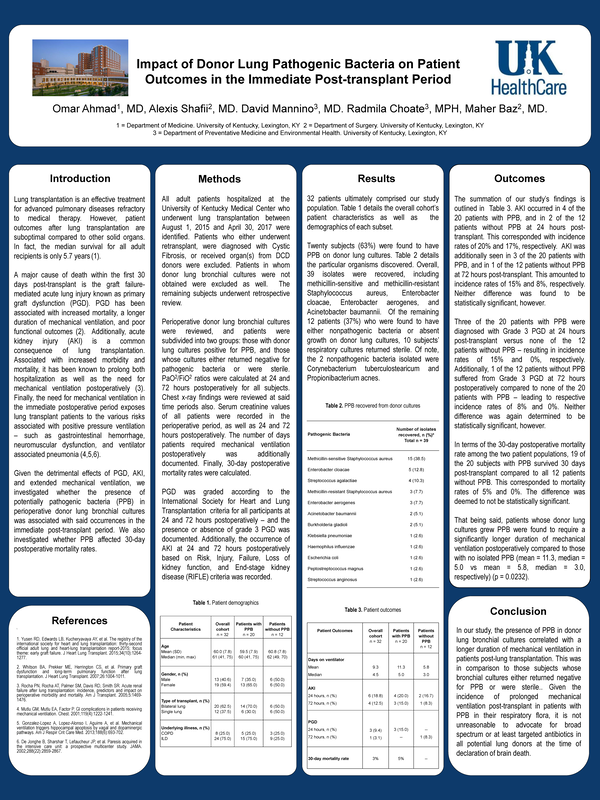|
The Sid Foundation donated $3000 to the University of Kentucky Hospital Lung Transplant Program at the end of 2017 to fund lung transplant research. Here is the research we funded: Here is a summary of the research written by the UK Healthcare team: "The generous gift from the Sid Foundation was used in two parts. First, funds were used to support research investigating the correlation between bacteria and organ rejection in post-lung transplant patients. Their research revealed a greater need for broad spectrum antibiotics at the time of donor brain death in order to limit harmful, life threatening bacteria and increase survival rates among lung transplant patients. Tangential research will allow for more advocacy in this arena, with the ultimate goal of limiting pathogenic bacteria and improving the life span of lung transplant patients. This research was presented at the International Society for Heart and Lung Transplantation in Niece, France. The investigators presented the attached poster. An abstract is below. Impact of Donor Lung Pathogenic Bacteria on Patient Outcomes in the Immediate Post-transplant Period Abstract: Lung transplantation is an effective treatment for advanced pulmonary diseases refractory to medical therapy. However, patient outcomes after lung transplantation are suboptimal compared to other solid organs. In fact, the median survival for all adult recipients is only 5.7 years. A major cause of death within the first 30 days post-transplant is the graft failure-mediated acute lung injury known as primary graft dysfunction (PGD). PGD has been associated with increased mortality, a longer duration of mechanical ventilation, and poor functional outcomes. Additionally, acute kidney injury (AKI) is a common consequence of lung transplantation. Associated with increased morbidity and mortality, it has been known to prolong both hospitalization as well as the need for mechanical ventilation postoperatively). Finally, the need for mechanical ventilation in the immediate postoperative period exposes lung transplant patients to the various risks associated with positive pressure ventilation – such as gastrointestinal hemorrhage, neuromuscular dysfunction, and ventilator associated pneumonia. Given the detrimental effects of PGD, AKI, and extended mechanical ventilation, we investigated whether the presence of potentially pathogenic bacteria (PPB) in perioperative donor lung bronchial cultures was associated with said occurrences in the immediate post-transplant period. We also investigated whether PPB affected 30-day postoperative mortality rates." If this still sounds too complicated to understand, don't worry. Your donations are helping increase the survival rate of lung transplant patients by funding lung transplant research.
Thank you for your donations! To help us keep growing, click here.
0 Comments
Leave a Reply. |

 RSS Feed
RSS Feed